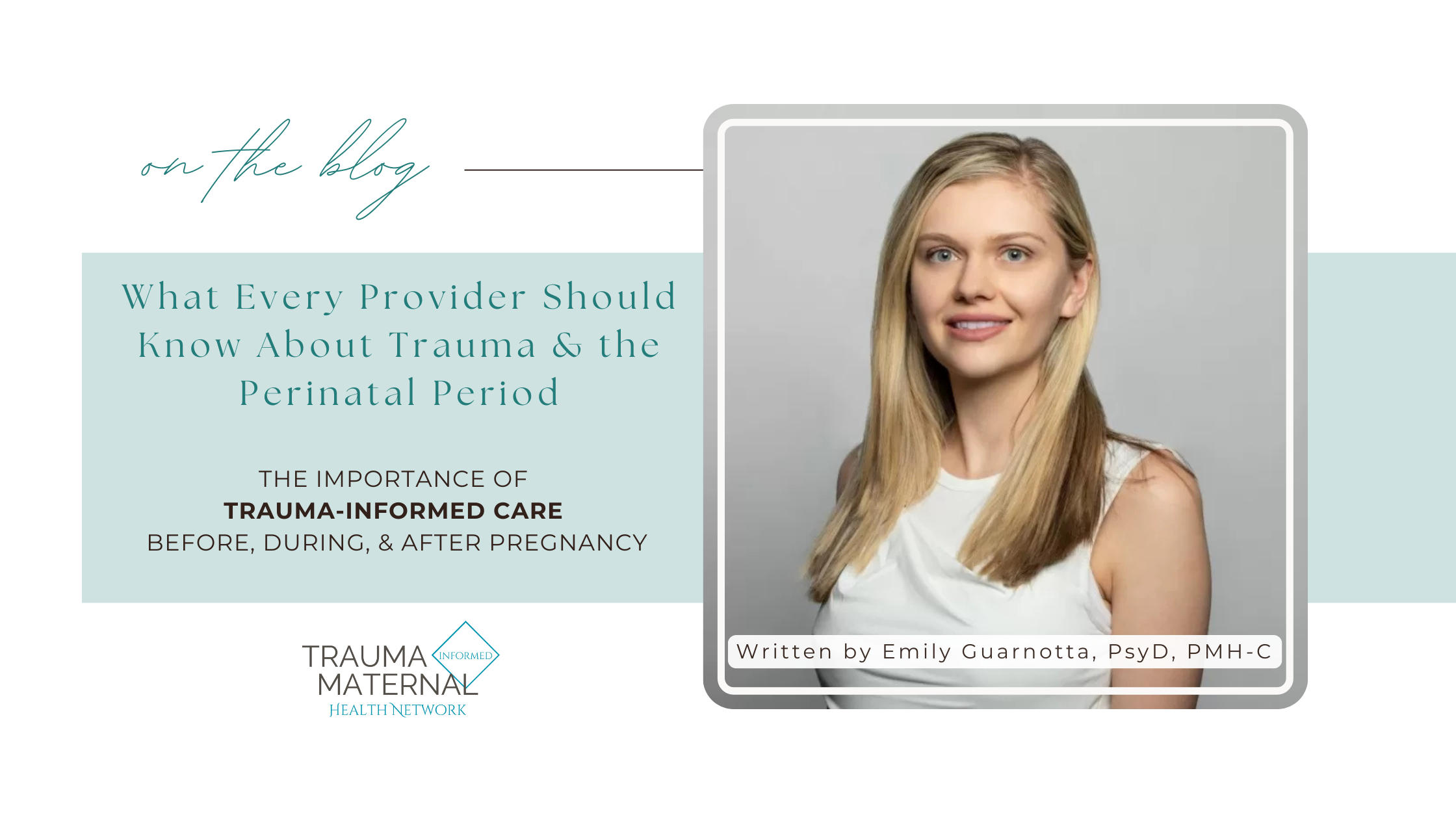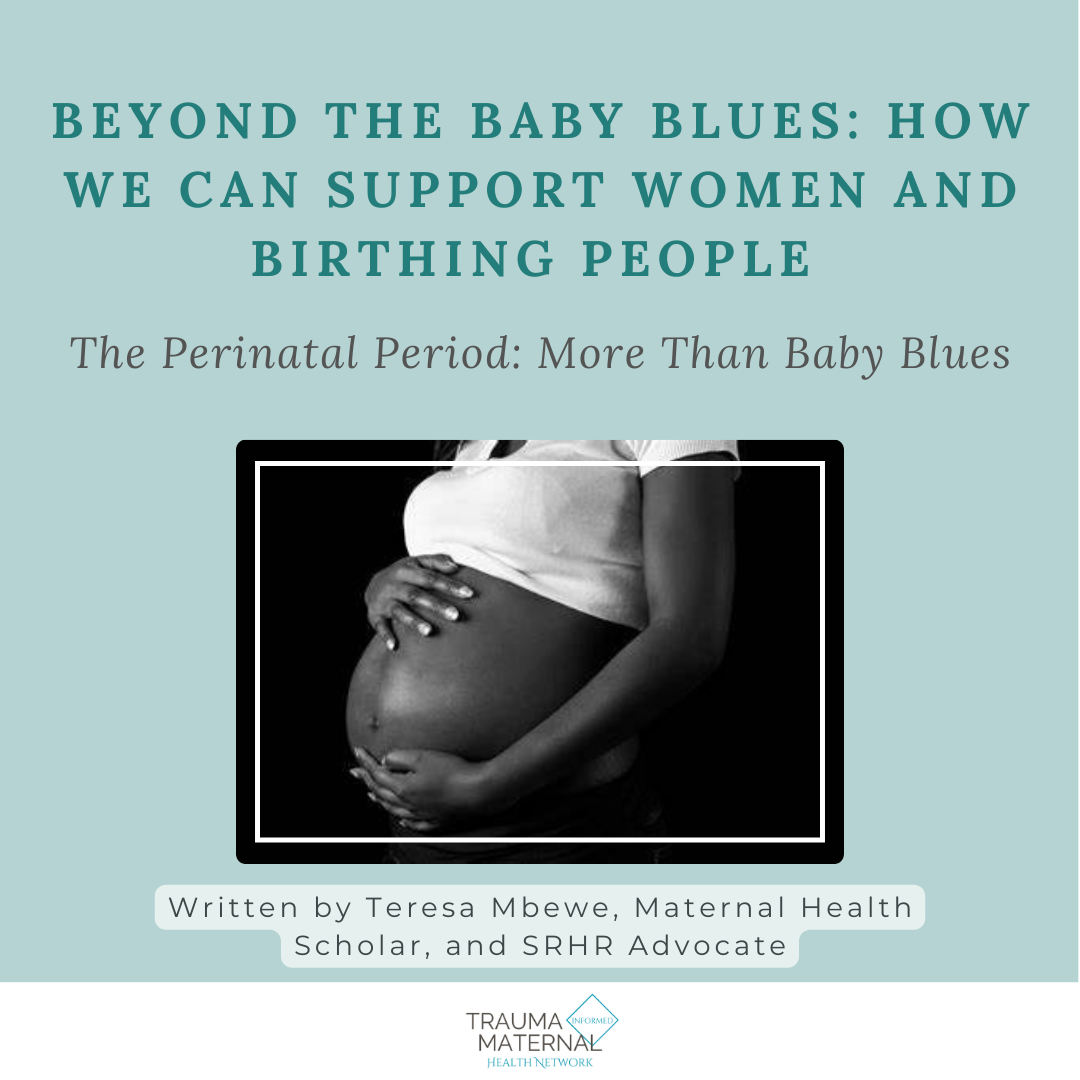What Every Provider Should Know About Trauma & the Perinatal Period | The Importance of Trauma-Informed Care Before, During, & After Pregnancy
Written by Guest Blogger Emily Guarnotta, PsyD, PMH-C
The perinatal period is a time of big change. It can bring about lots of joy, stress, and deep emotions. For many birthing people, it can also bring up memories of past traumas. This trauma can affect how they feel about their bodies, their birth, and their care.
While the perinatal period typically refers to pregnancy and the first year after birth, I’d like to extend this definition to also include those individuals who are trying to conceive or navigating pregnancy loss. While these events do not fall under the common definition of “perinatal,” in my opinion, these experiences also trigger past trauma and can be perceived as traumatic themselves.
Understanding How Trauma Shows Up in the Perinatal Period
Trauma can show up in many ways during the perinatal period, each carrying their own implications for perinatal care. These traumas may include, but are not limited to:
Childhood abuse and neglect, which can impact a birthing person’s ability to feel safe in vulnerable positions
Sexual trauma, which can make gynecological exams, labor, and breastfeeding challenging
Medical trauma related to infertility or other experiences
Birth trauma from previous pregnancies and losses
The perinatal period itself can also be traumatic, especially if a person experiences a lack of control, lack of informed consent, or feels dismissed at any point.
Trauma can manifest in ways that may be misunderstood by providers.
For example, a client might appear anxious and ask lots of questions during appointments. Another may dissociate and seem “checked out” or disconnected during exams or procedures. Others might experience panic attacks in vulnerable situations.
During the postpartum period, trauma survivors might struggle with bonding, experience heightened anxiety, and have trouble trusting their own instincts.
These trauma responses can occur regardless of whether a client discloses their trauma history to their providers. Many survivors have not identified their experiences as traumatic and therefore may not have the words to express it. They also might not feel safe opening up about their past with a new provider.
Providers, therefore, must recognize that at any point, a client’s past experiences might be impacting their present behaviors and responses. It’s critical to approach all interactions through a trauma-informed lens.
The Core Principles of Trauma-Informed Care
SAMHSA’s six key principles of trauma-informed care provide a roadmap for understanding and creating a trauma-informed environment for perinatal clients. Any provider who interacts with a perinatal client, whether it be an OBGYN, midwife, doula, therapist, or labor and delivery nurse, ought to incorporate these principles into their approach:
Safety involves creating a physical and psychological environment where clients feel secure and protected. In perinatal care, this means making sure that exams are done in private and maintaining predictable routines that help clients feel secure and grounded.
Trustworthiness and Transparency refers to using clear and honest communication with clients when discussing policies, procedures, and expectations. This involves explaining the purpose of exams, being honest about potential risks, sharing test results promptly, and communicating changes in care plans as soon as possible.
Peer Support is particularly important for perinatal clients who are vulnerable to isolation and loneliness. This means connecting clients with support groups, classes, or other parents who have had similar experiences. There is incredible healing power that comes from sharing your own experiences with someone who understands and who can provide validation and encouragement. I recommend that all perinatal providers keep an up-to-date list of local and online support groups.
Collaboration and Mutuality assumes that clients are the experts on their own experiences and healthcare should be a collaboration between client and provider. Providers can practice collaboration and mutuality by sharing all available options for care, as well as helping clients consider risks and benefits. And while providers should share their recommendations, trauma-informed care means respecting a client's preferences and autonomy. Healing happens through partnership, not hierarchy.
Empowerment, Voice, and Choice encourages the client’s self-advocacy and builds on their strengths. This could be offering options for labor positions, respecting feeding choices, and encouraging clients to advocate for their needs throughout the birthing experience.
Cultural, Historical, and Gender Awareness acknowledges how oppression impacts people’s experiences of trauma and healing, especially amongst marginalized groups. This includes understanding how racism, sexism, and homophobia contribute to trauma.
Here is one way that an OBGYN practices trauma-informed care during a routine exam.
“I’m going to explain exactly what I’m going to do before I do it. You can ask me to stop at any time and we can take breaks if you need to. Would you like me to walk you through each step?”
This statement honors the client’s safety, choice, and transparency while empowering the client to share their preferences.
Recognizing Trauma Triggers in Standard Perinatal Practices
Many aspects of perinatal care that might seem routine to providers can trigger trauma responses for survivors of abuse. Being asked to undress or being touched during an exam can trigger feelings of vulnerability and powerlessness. Surprise touch, like a provider caressing a client’s shoulder during an interaction, can be jarring for some trauma survivors.
The way that providers communicate with clients can also be triggering. Feeling rushed through appointments, having concerns dismissed, or being silenced when expressing preferences can also lead to feelings of powerlessness. Even medical language that seems harmless to providers might be triggering to clients. For example, terms like "incompetent cervix” or “failure to progress” can induce feelings of shame.
Providers almost never intend to harm their clients.
The very reason why they get into the medical or mental health field is to help others. Retraumatization is often unintentional and the provider is rarely aware of it. This is why it’s critical for all providers to understand the ways that trauma can be re-triggered and to take steps to practice trauma-informed care.
Rethink "Noncompliance" and "Anxiety"
The perinatal period often involves heightened emotions, increased vulnerability, and life changes.
For trauma survivors, these challenges can be intensified by their past experiences and may be misinterpreted by providers who are not versed in the impact of trauma.
Client behaviors that might seem “difficult” or “noncompliant” could be responses to past trauma. For example, a client who cancels several appointments in a row might appear uncommitted to their care, when in reality they are avoiding anxiety caused by a past medical trauma.
Another example is a client who declines their provider's recommendations. This might be perceived by the provider as overstepping, when the reality is that the client is exercising healthy boundaries based on past experiences.
Trauma-informed care involves reframing these behaviors as protective, rather than problematic.
Instead of labeling a client as “difficult,” trauma-informed providers explore and ultimately respect a client’s resistance. This approach recognizes that behaviors that might seem problematic often make sense when viewed through the lens of past experiences.
Practical Steps to Make Your Practice More Trauma-Informed
Creating a trauma-informed practice starts with creating an environment that feels welcoming, safe, and comfortable.
In an office setting, this means soft lighting, comfortable seating, clear exit points, and privacy.
Conversations amongst providers and staff about clients must always be done behind closed doors.
Normalizing discussions of mental health and trauma is important. Clients rarely open up if they are not asked.
Including questions like “Have you experienced any traumatic events that might affect your healthcare?” or “Are there any aspects of medical care that make you feel uncomfortable or anxious?” in intake paperwork can provide valuable information. This communicates that these topics are welcomed and important.
At the same time, trauma-informed care means allowing the client to lead these conversations, rather than pushing. If a client endorses a history of trauma, but is not comfortable sharing further, it is our job as providers to respect their choices.
Providers should also be informed of grounding techniques that can be offered to clients who are anxious before or during procedures or exams. When a client appears anxious, offering breathing exercises or guided imagery can help them feel calmer and more grounded. Some providers also keep stress balls, essential oils, or play calming music for clients who are nervous.
Another critical part of trauma-informed care is seeking consent and offering choices throughout every step of care. This means asking the client's permission before conducting an exam or procedure, rather than assuming that they are ready. Also, asking about preferred positions and checking in on their comfort level throughout can be helpful. Even choices that seem small, like letting the client choose where they sit, can be empowering.
All trauma-informed providers ought to have a referral list of other trauma-informed providers, especially mental health providers. The last thing you want is for a client to open up to you and to not have a safe space to offer them. The Trauma-Informed Maternal Health Directory is a valuable resource!
You Don't Need to Know Everything
You don’t need to be a trauma specialist in order to provide trauma-informed care.
What matters most is being curious about a client's experiences and responding with compassion when trauma is disclosed. It’s easy to fall into common pitfalls like trying to “fix the problem,” or minimizing the client’s experience because you feel uncomfortable. Though this may be well-intentioned, these responses can feel dismissive and silence further disclosure. Instead, listen without judgement and focus on ways that the client’s past experiences could be impacting their current care needs.
Questions like “How can I make you feel more comfortable during this exam?” honors the client as the expert and provides valuable feedback on how to support them.
As a trauma-informed provider, it’s also essential to have self-awareness when it comes to how your own experiences shape your responses. This means identifying your own triggers and developing strategies for maintaining professional boundaries while still being emotionally present with your clients. Consultation with colleagues, self-reflection, and ongoing continuing education are crucial.
The Ripple Effect: How Trauma-Informed Care Transforms Outcomes
The benefits of trauma-informed perinatal care can have lasting ripple effects that impact not only the individual client, but the family system as well.
Trauma-informed approaches lead to lower rates of birth trauma, higher client satisfaction, and stronger client-provider relationships.
When clients feel heard, respected, and empowered throughout their perinatal journey, they are more likely to seek care in the future and advocate for their needs in healthcare settings.
At the system level, trauma-informed care contributes to a broader shift toward more compassionate and inclusive healthcare. As more providers adopt this approach, the standards of care will improve for all clients, especially those from marginalized communities.
Recognizing and responding to trauma in the perinatal period is essential to improve the standards of perinatal care. Every interaction with a client has the potential to help or harm. Awareness of the impact of trauma on client’s behaviors leads to better outcomes and creates ripple effects that extend far beyond the individual to families, communities, and the broader healthcare system.
- - - - -
Guest Author: Dr. Emily Guarnotta, PsyD
Dr. Emily Guarnotta is a licensed clinical psychologist and certified perinatal mental health provider. She owns Phoenix Health, a therapy practice that supports anyone experiencing infertility, pregnancy loss, and perinatal mental health concerns.
Website: https://joinphoenixhealth.com/
Instagram: https://www.instagram.com/_phoenix_health/
Directory Listing: https://directory.maternaltraumasupport.com/search/phoenix-health.html
About the Trauma-Informed Maternal Health Directory
Liz Gray, LCSW and Olivia Verhulst, LMHC, PMH-C— co-founders of the Trauma-Informed Maternal Health Directory— are clinical psychotherapists with a deep passion for increasing accessibility of trauma-informed care to the maternal health population.
They created this specialized directory to connect women & birthing people to trauma-informed health & mental health providers who specialize in infertility, pregnancy, postpartum, and new parenthood.
Search the directory: https://directory.maternaltraumasupport.com/
Interested in writing a guest blog post?
If you are a trauma-informed provider who works with the perinatal population, submit a blog proposal HERE!
Please make sure the article is original content that aligns with our values of safety, inclusion, transparency, collaboration, empowerment, and support.




